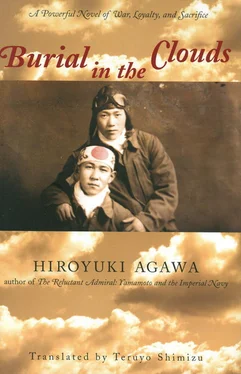Several days ago, Yoshino came to me with a somber look on his face and reported a dream he had had. He tells me that his soul left his body while he slept, and traveled to his home in Osaka. He says that, while there, it read Poems for the Reverend Emperor, which Yoshino himself had never read before, and that, now, he vividly remembers the lines of a poem in it. Yoshino was shaken. Maybe he has already sent you a postcard describing this incident. What touched me, though, was how thoroughly Yoshino struggles, thinking, as he takes matters so hard, that he must stir in himself a spirit of martyrdom, and that he must train himself up. No doubt he is anything but insincere. I can tell that by his look. Yet I think it highly symbolic that what Yoshino supposedly did, among all the other things he could have done, and would have wanted to do, at his old house, was read a bit of the Poems for the Reverend Emperor, such-and-such a poem celebrating the martyrdom of General Nogi. It was fortunate that Yoshino’s soul wasn’t caught when it went AWOL and given a blow by the rigorous guard commander at Tsuchiura Naval Air Station. Interestingly enough, though, in Yoshino’s outfit there is a geeky fellow named Wakatsuki from Takushoku University, and he has had in his possession, for some time now, this same book, volume one of Poems for the Reverend Emperor. Anyway, to me, it seems far more rational to suppose that Yoshino had read this poem a long time back, and had simply forgotten about it until it put in an appearance in his dream, than that his soul made an excursion to Osaka.
About a month ago, a Mr. Gakushu Ohara from the Association for the Enhancement of Imperial National Prestige visited our base, and gave a fanatical talk, pure gibberish, for two and a half hours, earning the ridicule of everyone present. He was one of those inspired leaders of whom there is an epidemic these days, the same genre of men you often complained about. Yoshino and Sakai were both scornful. But when things reach this point, we can’t content ourselves with sneering at Mr. Ohara alone, I think. Besides, fellows like this Mr. Something Ohara reap tidy profits making the rounds of the military training units and the schools, giving their “inspirational” speeches, and performing their “purifications.” And who knows, they may be perfect realists at heart, all the while laughing into their sleeves. But Sakai and Yoshino aren’t of a calculating turn of mind, and that makes me more apprehensive about them.
Professor E.
I know I wasn’t a very good student. I often put on airs, and now and then I launched into arguments against the theories of all you scholars out of conceit. Consequently, I was never a favorite with the professors. Many a time I wished I could, and thought I must, have an open, cheerful, supple mind, just like all the other students, but now I’m determined to stick to this cranky, arrogant disposition of mine. Only extraordinary crankiness can save you from being cajoled into the belief (and this, mind you, while leading the kind of life we lead here) that the war is indeed a great mission given to us by our country, and that our country will be saved by our martyrdom. Things will change someday. Our desperate feelings may not be understood forever, either by the older generation or the younger. Still, whenever I get the chance to see Yoshino and Sakai in private, I tell them, in the strongest terms possible, just how foolish it is to force themselves, and so rapidly, too, to change their way of thinking. Occasionally, after giving the matter some thought, they say, “You are right,” and we all agree in criticizing certain aspects of navy life and the general conduct of the war. But for the most part, they (Yoshino in particular) will not budge an inch, saying, “Still, at this point anyway, Japan must win the war. I take it to heart, as a Japanese citizen, that we must fight it all out, with the fate of our race at stake. It’s a supreme duty. You can’t quarrel with it. Our country will collapse if each of us starts to express his own particular view and turns his back.” Gazing into Yoshino’s earnest face makes me falter somewhat. It is true, the war is “in progress,” however wrong it may be. And though, as I say, I oppose the war and don’t want any longer to be a cog in its machinery, I can make no concrete answer if asked what it is I believe I should do. One possible course of action is simply to try to save my own life. Shrewd as I am, however, it would be extremely difficult for me, a navy pilot, alone to escape death. It’s not that I’ll be killed unless I finish off the enemy first. No, I’ll be eliminated whether or not I kill the enemy. It’s not that my friends will die unless I do. No, everybody must die, my friends, me, one and all. That such total war is our destiny I take for granted. Needless to say, I’m not prepared in the least.
I know I should explain to you why I ever volunteered to be a pilot, given the beliefs I hold. But I don’t have the courage to commit my thoughts about that to paper, not, anyway, until I have come to terms with my feelings in some measure. Be that as it may, at least I can say that part of the reason was my more or less irresponsible and apathetic attitude. Whichever course I took, I thought, piloting or reconnaissance, I wouldn’t have any control at all over my own life and death. To put it plainly, there was simply no guarantee whatsoever of my safe return, even if I went into reconnaissance.
Professor E.
I fear that you may be deeply disturbed on receiving this sloppily penciled letter. First of all, it must annoy you to read my illegible scrawl, and second, you may well feel that it is dangerous to have such a letter on hand. Please burn it when you are through. I don’t really believe, though, that what I say is especially dangerous or immoral, while I do concede that my writing is culpably verbose. Anyway, if we must endure such inconveniences, and run such risks, simply to think, say, and record thoughts as innocent as these, I have to wonder: What good can come of the civilization that my generation produces?
Well, now that I have begun, I will go ahead and say it. Lately I am all but convinced that we will lose this war. Don’t you agree? We are just a bunch of student reserves, still in training, but simply because we are now under the flag, and are quasi-officers, we regularly hear what appears to be confidential intelligence, of which you teachers are likely unaware. And judging from these scraps of information, it seems perfectly clear that, so far as materiel is concerned, the gap between Japan and America beggars belief. Japan lost most of the main force of her aircraft carriers in the Battle of Midway Island. Ninety-nine percent of our ace pilots, who had displayed skills unparalleled in the world at the beginning of the war, were killed in the air battle over the Solomon Sea. Due to changes in the complexion of naval combat, we have already passed the stage at which the super-dreadnoughts Yamato and Musashi might have demonstrated their capabilities. On the other hand, I hear that America, flush with her technological superiority in ordnance and radar, is steadily completing new armaments of terrifying scale. What is more, our line of defense in the southeastern theater is rapidly losing ground. I find it ironic that the tide of war has turned in this way, given that the U.S. Navy is said to do its utmost to save its crews’ lives, while the Japanese Imperial Navy still instructs its men that their entire duty is to die. Unless this war develops into some kind of “romantic” battle, in which a loyal subject emerges out of nowhere to lead our country to victory under his banner, it seems to me that Japan has no choice left but to carry its deteriorating military position forward to defeat. And I don’t think the end will be long in coming. This is no “Ten Years’ War” or “Hundred Years’ War,” as they sometimes say. I suspect that the war will be over within three years or so. And what if we manage to live that long, I sometimes fancy? Then Sakai, Yoshino, and the three hundred thousand odd students conscripted in the emergency call-up shall all be awakened from this hypnosis of war. And we shall find ourselves living in a defeated nation, Japan. The idea is so painful, even to me, that I can’t bear to imagine what the country will be like. But somehow we will make our way back to you, and to our old university in Kyoto. Well, I guess that’s just a fantasy after all. It will not happen. It’s too much, even for me, to assume that we will be alive three years down the road.
Читать дальше












